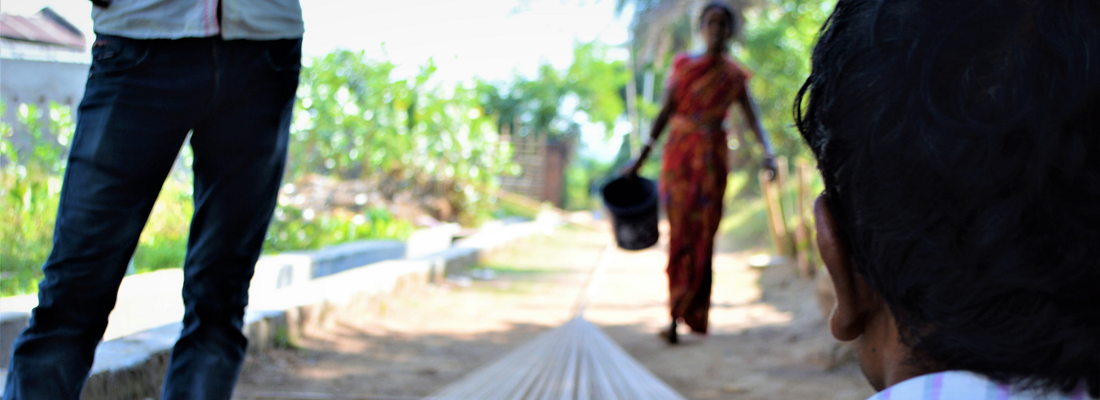
WORKING BASIS AND VISIONS
Overall objective/aim
We work for and believe in the possibility of improving living conditions and reduce poverty in developing countries (currently India). This is done through collaboration with the affected poor citizens as well as with local NGOs and local government bodies in the effort of strengthening the local culture and its values. By encouraging cooperation between the poor, local organizations and local public institutions and bodies, we seek to secure the political influence of the poor. By strengthening local democracy, sustainable and lasting improvements can be promoted for the poorest in society.
Our current projects focus on improving the conditions on food security and education (both for schoolchildren and in continued education). We work to educate and capacitate local artisans, in order to strengthen the business and income opportunities of the rural population and thereby to counter the growing migration from countryside to city.
We are a secular organization that does not select beneficiaries or projects on the bases of religious or political beliefs. We are not only rights-based, but also involve the local government bodies in our work, thereby creating a foundation for long-term improvements of the conditions of the poorest.
Principles of project work & target group
Our core values and principles are:
An interest/Engagement
Responsibility
Respect & trust in others
Openness
Learning and insight (both academically and culturally)
Sustainability
Social consciousness
Holistic thinking
An interest (in other people) is the beginning of everything new. At first glance, an eye to an eye, or iiINTERest.
Responsibility must be perceived as a necessity of life.
Respect and trust in each other is necessary, not least in volunteering.
Openness towards the different competences, experiences and perspectives we each bring with us into the organization is fundamental.
Learning and insight must be sought, creative and logical thinking must be unified, so our experiences can be disseminated more broadly.
Sustainability is the goal of our projects. Hence, our presence should not create dependence, but forms the basis for long-term, self-reliant type of development.
Social consciousness must apply at all stages of development.
Holistic thinking is a foundation for creating change that not only benefits the individual here and now, but also provide possibilities in the long-term for social, political, economic and cultural improvements for large sections of society.
In addition to working towards improving the living conditions of the poorest, we focus on particularly vulnerable groups among the citizens being part of our projects. Among these are single women, the elderly, people with disabilities and others, who, on the basis of their social conditions, live under particularly difficult conditions. These groups often need a longer-term effort to experience improvements in their living conditions.
As our task is huge and the funds are limited, it is important to seek to utilize every conceivable local resource. Collaboration between poor citizens, local organizations and (state) governments is a prerequisite for the changes to continue beyond a given project period where Danish funds are involved and make a difference. To ensure this, the target group must establish ownership over the projects from the beginning, meaning that that the poor should get involved right away, take responsibility, and gradually take control of the processes that affect their daily lives.
(Major) Changes start with small steps from which one learns from one’s own mistakes, adjusts and develops. This applies to all participants in our projects. Learning through processes is an important part of the endeavor for improvement. In this context, we also strive to see the projects from a holistic perspective, so that although we start small and focus on income improvements, over time we seek to include both political, social and cultural issues. And while the projects are most often based on theorganization of the poor women, our idea is that over time the men will join, the the families, then the local community and so on.
Collaboration with partner organization(s) in India:
Central to our work is the collaboration with our partner organizations in the project areas. Without these partners and their local insights, it makes no sense to seek to aim for sustainable development.
The collaboration is based on principles of mutual respect and trust – across both cultures and different personalities. We believe that with these values we can ensure open communication with each other and thereby enable the joint efforts needed to create positive change. Dealing with disagreements can be solved if we – in the right spirit – seek to listen and try to comprehend what is being said.
Despite the seriousness of the work, it is important to focus on and rejoice in the achievement of our goals, the progress (even if minor at times) and the learning that takes place. The energy invested in the work must come back through the work. We and our partners must learn from cooperation both as individuals and as organizations. Moreover, we seek to disseminate our experiences to other organizations and institutions in developing countries so that our insights can benefit other voluntary organizations and local government institutions.
Internal values and principles (organizational culture)
The above values and principles must also form the basis of our internal work culture in the association. In all processes and stages, there must be space and tolerance to vent all possible views and ideas – not least with joy and fun, even if the content is serious. The Board and all other responsible actors must be able to “catch a ball in the air” and be a mutual sparring partner of whether the sustainable ideas that may arise can be put into action. Working with accountability should not be burdensome; it must inspire energy and interest.
Søren, Gitte, Bodil, Poul & Katrine
